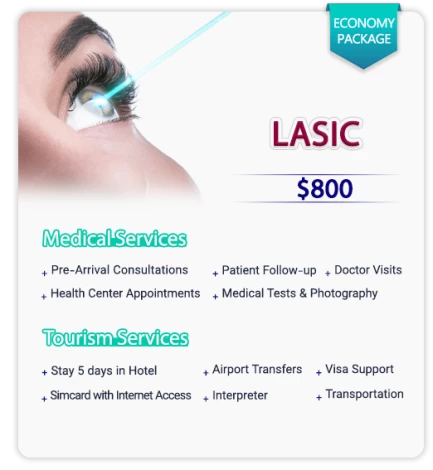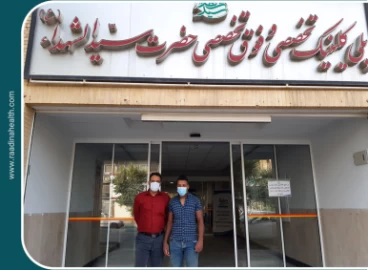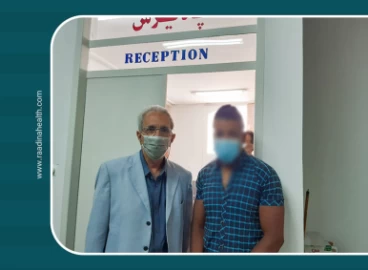Choosing LASIK eye surgery is a life-changing decision, and considering treatment abroad often comes with understandable concerns—safety, surgical expertise, technology, recovery time, and how everything will be managed from a distance. These questions are completely natural. Iran has become a trusted destination for advanced eye care, and with Raadina Health, the entire LASIK journey becomes clear, safe, and well-coordinated. From your first free consultation to post-surgery follow-up, we focus on transparency, medical quality, and continuous support. so you can move forward with confidence, clarity, and peace of mind.
Why Iran for Laser Eye Surgery?
As one of the world's main hubs of eye surgery, Iran has many knowledgeable and experienced ophthalmologists and the most advanced and precise laser devices. Moreover, Iran has the most modern and facilitated eye clinics where you can benefit from all kinds of eye care services under one roof. That being the case, many patients from all over the globe prefer to do eye surgery in Iran.
Cost of LASIK Surgery in Iran
On average, the cost of laser eye surgery in Iran ranges between $800 to $1,800. This price includes anesthesia, surgeon’s fee, follow-up medications, doctor’s visit, and clinic services such as post-op optometric examinations and 3D imaging.
The quality of healthcare services and the price of eye surgery in Iran are incomparable to other countries. For example, the cost of LASIK in the USA, Australia, and Canada ranges between $2.500 to $3.000 per eye. In European countries such as Germany, Spain, and the UK, LASIK costs $2.000 per eye.
Types of LASIK Surgery in Iran
In Iran, two types of LASIK surgery are practiced: standard and custom. In the following, these two methods are introduced briefly.
Standard LASIK
This method, known as traditional LASIK and conventional LASIK, was first invented in the 1990s and has been successful until now. This surgery is safe and suitable for people with lower-order aberrations such as myopia, hyperopia, astigmatism, and standard pupil size. The only shortcoming of this method is that, in some cases, the patient may still experience some visual errors after the surgery.
Custom LASIK
In this method, the optical aberration is first detected by a laser device, and then the eye’s deficiency is eliminated by using an advanced and customized surgical device. This surgery is suitable for patients who suffer lower- or higher-order aberrations and those with large pupil sizes. By performing custom LASIK surgery, the patient’s vision will be %100 corrected, and they will not experience any serious complications. However, this method is unsuitable for all patients; people with small pupil sizes, severe astigmatism, and severe myopia are not proper candidates for this surgery.
Best Ophthalmologist for LASIK Surgery in Iran
Although LASIK is a common refractive surgery, it is delicate and should be done by the hands of an accurate and experienced ophthalmologist. Fortunately, Iran has numerous skilled ophthalmologists who are experts in diagnosing the disease as well as treating them. Iranian eye surgeons have all graduated from top medical schools and universities in Iran and around the globe and can enhance your blurred vision in the blink of an eye.
Procedure of LASIK Surgery in Iran
LASIK is an outpatient surgery; the only anesthetic used in this operation is an eye drop that numbs the eye's surface. Since during laser eye surgery, the eyes get wet, a special ring is placed around the eyelid to prevent eye movement. During the operation, you will be asked to look directly at a point of red light.
Then, the surgeon removes your corneal flap and reshapes the cornea. After that, the surgeon returns the flap to its original position. The flap attaches to its desired place without sutures. At last, a bandage contact lens (BCL) is placed on the cornea to protect it from edema, dry eye, and friction.
How to Apply for LASIK Eye Surgery in Iran
Applying for LASIK eye surgery in Iran may feel overwhelming at first, especially when you are considering treatment abroad. Patients often have questions about eligibility, safety, medical standards, and how the entire process will be managed from a distance. With Raadina Health, the process is simple and transparent. You start with a free online consultation, where your medical history and eye condition are reviewed, and all steps, timelines, and costs are explained clearly. From there, our team coordinates everything needed for your treatment journey, ensuring you feel informed and confident before making any decisions.
Easy LASIK Eye Surgery in Iran with Raadina Health
Choosing LASIK surgery is an important decision, and concerns about quality, technology, surgeon experience, and follow-up care are completely natural. At Raadina Health, we focus on removing uncertainty from the process. We work closely with trusted ophthalmology centers and experienced eye surgeons, using modern diagnostic equipment and internationally recognized LASIK techniques. From your first consultation to post-treatment follow-up, our team stays by your side, ensuring smooth communication, clear expectations, and continuous support—so you can focus on restoring clear vision with peace of mind.
Special Services for International Patients
To make your LASIK treatment experience in Iran comfortable and stress-free, Raadina Health provides comprehensive support services, including medical visa assistance, airport transfer, local transportation, accommodation arrangements near the clinic, and professional medical interpreters. We also coordinate all medical appointments and ensure you receive clear guidance before and after surgery. These services are designed to eliminate logistical concerns and allow you to fully concentrate on your treatment and recovery.
Patient Experiences with Raadina Health
Many patients initially feel anxious about eye surgery abroad—especially when it comes to vision, one of the most sensitive aspects of health.
Daniel, 29, from Germany, had been wearing glasses for years and was nervous about LASIK surgery outside his home country. From his first online consultation with Raadina Health, he felt reassured by the clear explanations and honest communication. Upon arrival in Iran, everything was well organized—from clinic visits to translation support. After the procedure, Daniel shared:
“What made the difference was feeling supported at every step. I knew exactly what was happening, and that gave me real confidence.”
Experiences like this reflect Raadina Health’s commitment to patient comfort, transparency, and continuous care.
Treatment Journey: From First Contact to Full Recovery
Your LASIK journey with Raadina Health begins with a free consultation, where we assess your eligibility and answer all your questions. After reviewing your eye condition, a personalized treatment plan is created in coordination with the ophthalmology center. Once you arrive in Iran, our team manages your appointments, transportation, and communication with the medical staff. The procedure itself is quick, and we ensure proper post-surgery instructions and follow-up support. Even after you return home, our team remains available to guide you during recovery and address any concerns.
Free Consultation & Contact Raadina Health
If you are considering LASIK eye surgery in Iran, our team is ready to guide you. Contact Raadina Health today for a free, confidential consultation. We are here to answer your questions, explain your options clearly, and help you make a confident decision about your vision and eye health.
FAQs about LASIK Eye Surgery in Iran
How long does LASIK surgery take in Iran?
Depending on your eye number and the required correction, LASIK eye surgery in Iran usually takes less than 10 minutes for each eye. However, you should be in the eye clinic for about 1/5 hour on the day of the surgery.
How long should I stay in Iran after LASIK surgery?
LASIK surgery is an outpatient operation, and you will be discharged from the hospital right after the surgery. However, resting at home or hotel for a couple of days is suggested before going back home since your eyes may be irritated and itchy for some days.
Is LASIK eye surgery in Iran legal and safe?
Yes. LASIK eye surgery is a well-established and legally performed procedure in Iran, carried out by licensed ophthalmologists in certified medical centers following strict medical standards.
How long does the LASIK treatment process take?
The LASIK procedure itself usually takes less than 30 minutes. Most patients stay in Iran for a short period to complete evaluations, surgery, and initial follow-up.
Is my medical information kept confidential?
Absolutely. Raadina Health strictly protects patient privacy and ensures all medical records and personal information remain confidential.
Is there support after the procedure?
Yes. Our support does not end after surgery. Raadina Health provides post-treatment guidance and remains available to answer questions and assist during your recovery period.




comments
No reviews